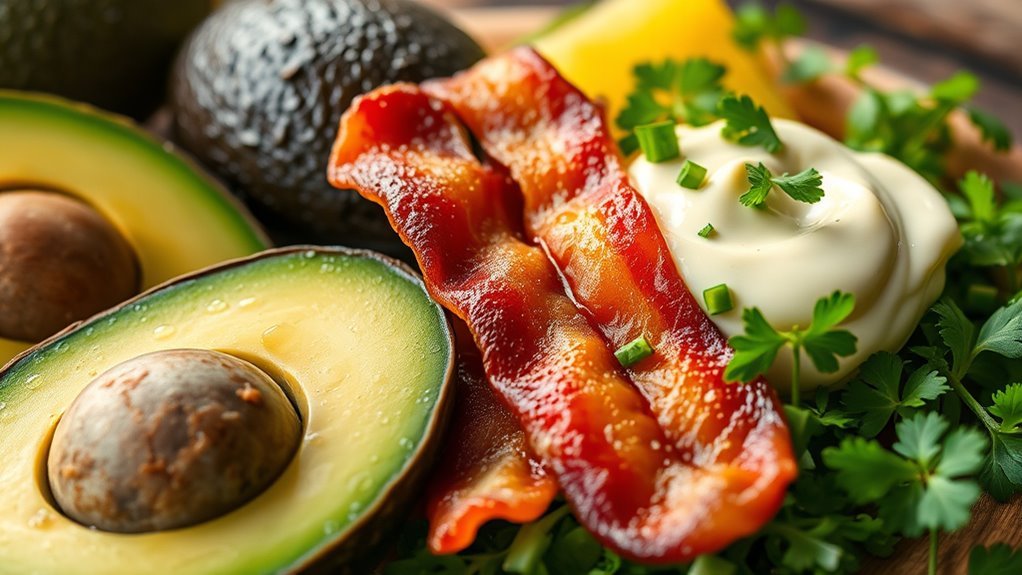The ketogenic diet, or keto, is a low-carbohydrate, high-fat eating plan that helps your body enter ketosis. In this state, fat becomes your primary energy source instead of glucose, leading to various benefits like weight loss and improved mental clarity. You’ll want to include healthy fats, low-carb vegetables, and quality proteins while avoiding high-carb foods like grains and sugary snacks. Exploring the details can help you adopt this lifestyle effectively and enjoy its advantages.
Understanding the Ketogenic Diet

The ketogenic diet, often referred to as keto, is a low-carbohydrate, high-fat eating plan designed to shift your body into a state of ketosis. This approach isn’t just a modern fad; its keto history dates back to the 1920s when it was developed to treat epilepsy. By markedly reducing carbohydrate intake, your body undergoes metabolic adaptation, using fat as its primary energy source instead of glucose. This change can lead to various benefits, including weight loss, improved mental clarity, and enhanced energy levels. Understanding the principles of keto allows you to experience these advantages while enjoying a diverse range of foods. With the right knowledge, you can embrace this liberating lifestyle and achieve your health goals effectively.
How Ketosis Works

Achieving ketosis typically takes about 2 to 4 days of greatly reducing carbohydrate intake. During this ketosis process, your body undergoes a metabolic shift, changing from using glucose as its primary energy source to burning fat. When you cut carbs, insulin levels drop, prompting your liver to convert fatty acids into ketones. These ketones become your new fuel, providing energy for your brain and body. This shift not only helps in weight management but also stabilizes your energy levels. As you adapt to this new energy source, you may experience increased mental clarity and reduced cravings. Embracing this metabolic change can empower you, offering a sense of freedom from traditional dietary restrictions and promoting a healthier lifestyle.
Benefits of Following a Keto Diet

Following a keto diet can lead to significant weight loss success by shifting your body into fat-burning mode. Many people also report improved mental clarity and focus, which can enhance daily productivity. Additionally, you’ll likely experience increased energy levels, making it easier to stay active and engaged throughout the day.
Weight Loss Success
While many diets promise quick results, the keto diet stands out for its ability to promote significant weight loss through a low-carb, high-fat approach. This dietary shift can lead to a state called ketosis, where your body efficiently burns fat for energy. Numerous keto testimonials and success stories highlight how individuals have shed pounds and reclaimed their freedom from restrictive eating habits.
Here’s a quick look at potential benefits you might experience:
| Benefit | Description | Evidence |
|---|---|---|
| Rapid Weight Loss | Initial fat loss due to reduced carb intake | Studies show 2-3 times more weight loss than low-fat diets |
| Reduced Hunger | Ketosis can suppress appetite | Participants report less frequent cravings |
| Improved Energy | Fat becomes a reliable energy source | Users feel more energized throughout the day |
| Better Metabolism | Increased fat oxidation | Enhanced metabolic rate observed |
| Easier Meal Prep | Simpler meals with fewer ingredients | Streamlined cooking process reported |
Embracing keto could be your path to lasting weight loss success!
Improved Mental Clarity
As your body adapts to a ketogenic diet, you might notice enhanced mental clarity, a benefit that many followers rave about. This cognitive boost stems from the brain’s efficient use of ketones as fuel, promoting overall brain health. Many report feeling more focused and alert, which can lead to improved productivity and creativity.
- Increased concentration and focus
- Enhanced memory retention
- Greater mental resilience
These cognitive benefits make the keto diet appealing for those seeking mental freedom and better performance in daily tasks. By reducing sugar consumption and stabilizing insulin levels, you can experience a clearer mind and sharpened mental faculties, allowing you to navigate life’s challenges with more ease and confidence.
Enhanced Energy Levels
When you shift to a ketogenic diet, you may experience a significant boost in energy levels that many enthusiasts find invigorating. This increase in keto energy stems from your body adapting to burning fat for fuel instead of carbohydrates. As you reduce carb intake, your metabolism undergoes a transformation, leading to a more efficient energy source in the form of ketones. This metabolism boost can help you power through workouts and daily tasks with renewed vigor. Many people report feeling more energetic and less fatigued throughout the day. By embracing the keto lifestyle, you’re not just fueling your body; you’re revealing a sustainable energy source that supports your freedom to live life to the fullest.
Common Misconceptions About Keto
What misconceptions do people often have about the keto diet? Many believe these keto myths can deter them from trying it. Understanding the truth can empower your dietary choices. Here are a few common diet misconceptions:
- Keto is just a high-fat diet: While fat intake is increased, it’s the low carb intake that makes keto effective.
- You can’t eat fruits or vegetables: Many low-carb options exist, and vegetables are still an essential part of a keto diet.
- Keto is unsustainable long-term: Many people successfully maintain a keto lifestyle for years, adapting it to fit their needs.
Foods to Include in Your Keto Meal Plan
Incorporating a variety of foods into your keto meal plan is essential for achieving and maintaining ketosis while ensuring balanced nutrition. Focus on high-quality fats like avocados, olive oil, and nuts. Incorporate low-carb vegetables such as spinach, kale, and broccoli to boost your nutrient intake without kicking you out of ketosis. For protein, opt for grass-fed meats, eggs, and fatty fish. Don’t forget to include keto friendly snacks like cheese, beef jerky, or nut butter for those in-between meal cravings. Meal prep can simplify your week, allowing you to plan delicious, satisfying meals that keep you on track. With the right foods, you’ll enjoy the freedom to indulge in flavors while nourishing your body effectively.
Foods to Avoid on a Keto Diet
When you’re on a keto diet, it’s essential to steer clear of high-carb foods, which can disrupt your body’s ability to enter ketosis. Sugary snacks and starchy vegetables also need to be avoided, as they can lead to unwanted spikes in your blood sugar levels. By focusing on what to eliminate, you’ll have a better chance of achieving your dietary goals.
High-Carb Foods
To successfully adhere to a keto diet, you’ll need to steer clear of high-carb foods that can sabotage your goals. These foods can spike your insulin levels and kick you out of ketosis, so it’s essential to identify and avoid them.
Here are some high-carb foods to look out for:
- High carb grains: Bread, pasta, and rice can quickly derail your progress.
- High carb snacks: Chips, pretzels, and granola bars are often loaded with sugars and should be replaced with keto-friendly options.
- Sugary fruits: Bananas, grapes, and apples can add excessive carbohydrates to your daily intake.
Sugary Snacks
Avoiding sugary snacks is essential for anyone on a keto diet, as they can quickly undermine your efforts to maintain ketosis. Sugary treats, like candies and pastries, are loaded with carbs and can kick you out of fat-burning mode. Instead, look for healthy snacks that align with your keto goals. Snacks made with sugar alternatives, such as stevia or erythritol, can satisfy your sweet tooth without derailing your progress. Nuts, cheese, and avocado are also great options that provide healthy fats and keep you feeling full. By consciously choosing your snacks, you can enjoy delicious flavors while staying committed to your keto lifestyle. Remember, your choices determine your freedom on this journey!
Starchy Vegetables
While it’s important to steer clear of sugary snacks on a keto diet, you’ll also want to be mindful of starchy vegetables. These veggies can considerably impact your carb intake, hindering your ability to maintain ketosis. Here are some common starchy vegetable types to avoid:
- Potatoes
- Corn
- Peas
Instead, consider keto vegetable substitutes like leafy greens, cauliflower, or zucchini. These alternatives are low in carbs and high in nutrients, making them perfect for satisfying your cravings without derailing your progress. By choosing the right vegetables, you can enjoy the freedom of a keto lifestyle while still getting your daily vitamins and minerals. Remember, every choice counts on your journey to ideal health!
Tips for Transitioning to a Keto Lifestyle
Shifting to a keto lifestyle can be challenging, but with the right strategies, you can make the process smoother and more sustainable. Meal prep is essential—plan your meals ahead to avoid impulse eating and guarantee you have keto-friendly options on hand. Start with simple recipes that excite you and gradually expand your repertoire. In social situations, don’t hesitate to communicate your dietary choices; many restaurants offer keto-friendly menu options. Bringing your own dishes to gatherings can also be a game-changer. Hydration is key, so drink plenty of water, and consider electrolyte supplements to balance your body. Remember, it’s about finding what works for you, so embrace the journey and enjoy the newfound freedom that comes with a keto lifestyle.
Potential Risks and Considerations
Adopting a keto lifestyle can bring numerous benefits, but it’s important to be aware of potential risks and considerations. While many thrive on this diet, individual variations can lead to nutrient deficiencies and digestive issues. Long-term sustainability might also be a concern, particularly regarding kidney health and electrolyte imbalance.
- You may experience potential side effects like fatigue, headaches, or mood swings during the initial shift.
- Regular medical supervision is advisable, especially if you have pre-existing conditions.
- Staying informed about your nutritional intake can help mitigate the risk of deficiencies.
What is the ketogenic diet?
The ketogenic diet, commonly known as keto, is a high-fat, low-carbohydrate diet designed to promote weight loss and improve overall health. By drastically reducing carbohydrate intake and replacing it with fat, the body enters a metabolic state called ketosis, where it becomes efficient at burning fat for energy instead of glucose from carbs.
How does the ketogenic diet work?
The ketogenic diet works by significantly lowering carbohydrate intake, which in turn reduces insulin levels and allows the body to access stored fat for energy. When carbs are scarce, the liver converts fatty acids into ketones, which serve as an alternative energy source for the brain and other tissues. This shift from using glucose to ketones is what defines the state of ketosis.
What foods are allowed on a keto diet?
On a keto diet, the focus is on high-fat, moderate-protein, and very low-carb foods. Allowed foods include healthy fats (like avocados, olive oil, and nuts), meats (such as beef, chicken, and fish), full-fat dairy products, eggs, and non-starchy vegetables (like leafy greens, broccoli, and cauliflower). Foods to avoid include sugars, grains, starchy vegetables, and most fruits due to their high carbohydrate content.
What are the potential benefits of following a ketogenic diet?
The potential benefits of a ketogenic diet include significant weight loss, improved blood sugar control, increased energy levels, enhanced mental clarity, and reduced inflammation. Some studies also suggest that the keto diet may help with conditions such as epilepsy, type 2 diabetes, and certain neurological disorders. However, individual results can vary, and it’s essential to consult with a healthcare professional before starting the diet.
Are there any side effects of the ketogenic diet?
Yes, while many people can successfully follow a ketogenic diet, some may experience side effects, particularly during the initial transition to ketosis. Common side effects include fatigue, headaches, dizziness, nausea, and irritability, often referred to as the “keto flu.” These symptoms usually subside after a few days to weeks as the body adapts to burning fat for fuel. Staying hydrated, maintaining electrolyte balance, and gradually reducing carbohydrates can help alleviate these effects. Always consult a healthcare professional if side effects persist or worsen.
References
- https://www.wikiwand.com/en/Ketogenic_diet
- https://www.ncbi.nlm.nih.gov/pmc/articles/PMC7071038/
- https://www.healthline.com/nutrition/what-is-the-keto-diet
- https://www.cdc.gov/healthyweight/healthy_eating/dietary_guidelines.html
- https://www.mayoclinic.org/healthy-lifestyle/nutrition-and-healthy-eating/in-depth/keto-diet/art-20459816
- https://www.nutrition.gov/topics/whats-your-keto-diet
- https://www.verywellfit.com/keto-diet-4692960
- https://www.hsph.harvard.edu/nutritionsource/keto-diet/


